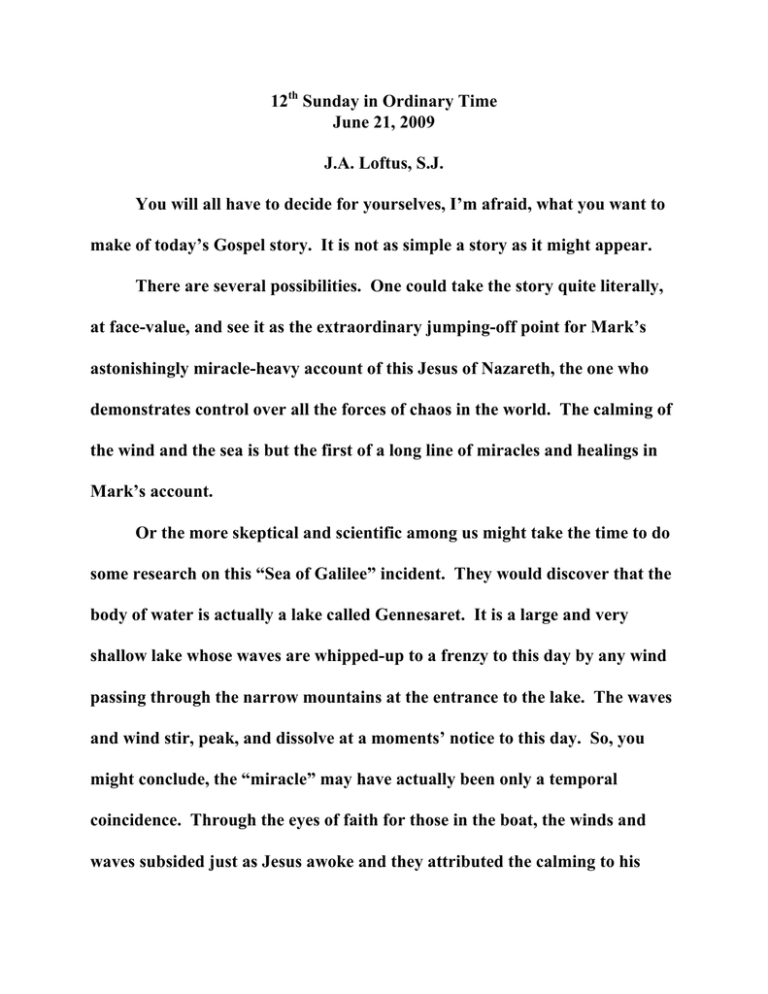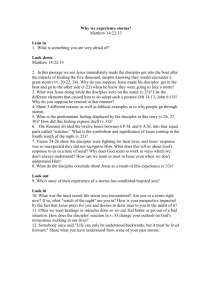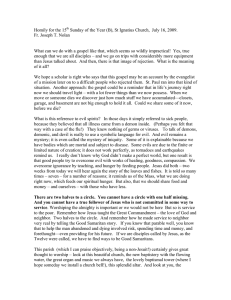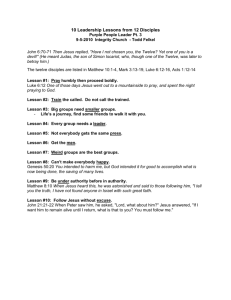12 Sunday in Ordinary Time June 21, 2009 J.A. Loftus, S.J.
advertisement

12th Sunday in Ordinary Time June 21, 2009 J.A. Loftus, S.J. You will all have to decide for yourselves, I’m afraid, what you want to make of today’s Gospel story. It is not as simple a story as it might appear. There are several possibilities. One could take the story quite literally, at face-value, and see it as the extraordinary jumping-off point for Mark’s astonishingly miracle-heavy account of this Jesus of Nazareth, the one who demonstrates control over all the forces of chaos in the world. The calming of the wind and the sea is but the first of a long line of miracles and healings in Mark’s account. Or the more skeptical and scientific among us might take the time to do some research on this “Sea of Galilee” incident. They would discover that the body of water is actually a lake called Gennesaret. It is a large and very shallow lake whose waves are whipped-up to a frenzy to this day by any wind passing through the narrow mountains at the entrance to the lake. The waves and wind stir, peak, and dissolve at a moments’ notice to this day. So, you might conclude, the “miracle” may have actually been only a temporal coincidence. Through the eyes of faith for those in the boat, the winds and waves subsided just as Jesus awoke and they attributed the calming to his presence. It was just a coincidence. Still others have suggested that, while Jesus certainly did a number of strange and striking things while in their midst, this story seems like a “fishstory” compiled from any number of bizarre experiences his disciples had. You know how fish stories grow! In any case, this is not a simple story– despite first appearances. Regardless of how literally you want to take the story, it is clear that the author of the story, St. Mark, had–if you will pardon the pun–another fish to fry in telling it. The story is a rather profound illustration of the major dance between fear and faith that permeates Mark’s gospel. Mark’s gospel is filled with instances of the disciples being afraid. Sometimes, as in today’s reading, Mark even goes so far as to say they “feared with a great fear.” (Our translation, as well as many others, renders that second “fear” as awe. But the Greek word is not awe; it is fear.) The same fear that overwhelms the disciples at the baptism of Jesus, his transfiguration, twice during his passion, and even at his empty tomb. It is always the same word used, and it always signifies an epiphany, that is, a manifestation of the power of God breaking into human history. There is always fear when God enters history to calm chaos. There was 2 “in the beginning,” in the book of Genesis, as God separated the waters and created the world. There is fear in Psalm 107 that we just sang: “...they called from the abyss in their great distress...” and God calmed their hearts. There was great fear as Pharaoh closed in on the Israelites at another great sea in Jewish history, the Red Sea, and they “crossed over” in calm. That same phrase–cross over–is used in today’s gospel story; Jesus says to the disciples: “Let us cross over to the other side.” Does that phrase “crossing over” sound familiar in our own day? Remember all the hype a few years back–there was even a TV program–about people being able to “cross over” from the other side of death and connect with living relatives? It is the exact same sense in which Mark has Jesus say to the disciples: “let us cross over.” What starts out as a seemingly insignificant boat trip for them all becomes a profound invitation from Jesus to join him in “crossing over.” Cross with me from death to new life; cross with me from fear to faith. Know that I am God! (With all the echoes of the prophets and kings of Israel.) Know that I am your God and will be always with you. Cross over with me! But the disciples make a terrible mistake–and Mark records it in a second strange phrase in this story. Mark says that the disciples “took Jesus 3 with them just as he was.” Doesn’t that sound strange to you? What does it mean “just as he was.” Was he unkempt from days of preaching from the boat? Was he smelly, or disheveled? No, to take Jesus “just as he was” meant to Mark that, without realizing it, the disciples agreed to take Jesus, well, “just as he was.” He was the preacher who had been teaching the mysteries of God’s kingdom to everyone in the countryside. And he was explaining all the meaning of the parables and sayings to the disciples privately. He was who he is, the Son of God and the Son of David. And they rather naively agree to take him “as he was.” But the disciples cannot make it across to the other side with him–at least not yet. There is still too much fear. They panic and even seem to get indignant and peeved: “Do you not care that we are perishing?” Or, in slightly more contemporary jargon: “We’re dying here, man. And all you can do is sleep?” Does Mark have any lessons for us in mind? Indeed he does. A few. There will be storms in any crossing-over. When faith confronts the waves, the waves usually win. But angry waves can be calmed. The reins of chaos are, indeed, held by their creator and his only begotten Son. But who knows how? Or why? The invitation to the first disciples–as well, perhaps, as to us– 4 is to weatherproof our hearts. And let ourselves be carried in the rickety and leak-sprung dinghy we call the church, the Body of Christ. The only one who has the power to bring calm. But as I said at the beginning, we each have to decide for ourselves what we want to make of the story of the storm at sea. It is not a simple story! Good luck. And Peace! 5







